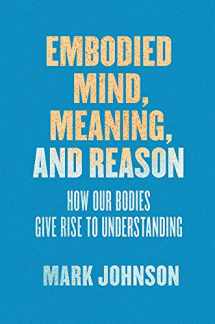
Embodied Mind, Meaning, and Reason: How Our Bodies Give Rise to Understanding
ISBN-13:
9780226500119
ISBN-10:
022650011X
Edition:
1
Author:
Publication date:
2017
Publisher:
University of Chicago Press
Format:
Hardcover
240 pages
FREE US shipping
Book details
ISBN-13:
9780226500119
ISBN-10:
022650011X
Edition:
1
Author:
Publication date:
2017
Publisher:
University of Chicago Press
Format:
Hardcover
240 pages
Summary
Embodied Mind, Meaning, and Reason: How Our Bodies Give Rise to Understanding (ISBN-13: 9780226500119 and ISBN-10: 022650011X), written by authors
, was published by University of Chicago Press in 2017.
With an overall rating of 4.4 stars, it's a notable title among other
books. You can easily purchase or rent Embodied Mind, Meaning, and Reason: How Our Bodies Give Rise to Understanding (Hardcover) from BooksRun,
along with many other new and used
books
and textbooks.
And, if you're looking to sell your copy, our current buyback offer is $0.31.
Description
Mark Johnson is one of the great thinkers of our time on how the body shapes the mind. This book brings together a selection of essays from the past two decades that build a powerful argument that any scientifically and philosophically satisfactory view of mind and thought must ultimately explain how bodily perception and action give rise to cognition, meaning, language, action, and values. A brief account of Johnson’s own intellectual journey, through which we track some of the most important discoveries in the field over the past forty years, sets the stage. Subsequent chapters set out Johnson’s important role in embodied cognition theory, including his cofounding (with George Lakoff) of conceptual metaphor theory and, later, their theory of bodily structures and processes that underlie all meaning, conceptualization, and reasoning. A detailed account of how meaning arises from our physical engagement with our environments provides the basis for a nondualistic, nonreductive view of mind that he sees as most congruous with the latest cognitive science. A concluding section explores the implications of our embodiment for our understanding of knowledge, reason, and truth. The resulting book will be essential for all philosophers dealing with mind, thought, and language.


We would LOVE it if you could help us and other readers by reviewing the book
Book review

Congratulations! We have received your book review.
{user}
{createdAt}
by {truncated_author}


